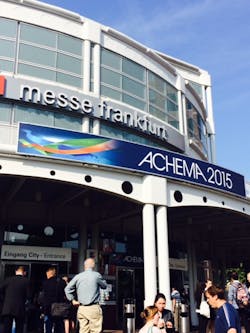Every three years, important players in the process industry arrive in Frankfurt, Germany to attend a major trade fair. Also referred to as the global summit for process engineering, Achema acts as a hub for end users and vendors alike to share information on instrumentation, equipment, automation and packaging technologies for the pharmaceutical, biotechnology, and chemical industries.
At Achema 2015 this week, the focus is on sustainability. “We are living in the world of tomorrow,” says Dr. Rainer Diercks, Chairman of Dechema e.V., the network for chemical engineering and biotechnology in Germany. “The question is how will we live in the future when it comes to food, medical care, water, and energy?”
The answer can be found in the miles of hallways and thousands of vendors displaying innovative technologies here at the exhibition. While there is a clear focus on the role of packaging, automation, instrumentation, and mechanical systems, there is also a new emphasis on process analytics and industrial water management, two areas that are important for addressing evolving challenges in the chemical and life sciences industries.
Areas of key interest include process intensification-- which are techniques used to reduce a plant footprint or energy use by combining operations-- as well as simulation software to lower the need for pilot trials, and analytical technologies to get the most out of experimental data. These are the same technologies used by oil refiners, for example, which face cost and reliability pressure and therefore need to get process designs right the first time. But adopting new technology is a challenge for drug makers restricted by pharmaceutical processes that are difficult to change once validated by regulators.
Nevertheless, the message rings loud and clear here: Innovation must happen as new constraints on raw materials and the pressures of safety and environmental performance continue to impact the process industries.
During the Achema opening session, Dr. Diercks and his colleagues focused on German innovation specifically, noting that the chemical sector is actually one of the top three industries in Germany, right up there with automotive manufacturing. There is a focus on specialty chemicals moving forward. But in order to flourish, this industry needs government support in the form of tax incentives for companies, government-funded research, as well as an investment in education.
With that in mind, the Achema committee did something different this year. While tax incentives may be out of their realm of control, they are investing in education by sponsoring local school programs designed to get young children interested in engineering. In addition, this year the organization introduced the first Achema Start-Up Awards designed to recognize future entrepreneurs in biotech, life sciences, and energy.
To be considered for this award—which includes a cash price of 10,000 euros-- participants must submit a business plan for review by a panel of experts who judge from both a technological and economical point of view. The aim is to support these companies in opening up a new business area and thus respond to the pressing challenges of the future.
The best three submissions are selected in three categories, including energy, industrial biotech, and measurement & analytics. During the opening session of Achema, the finalists—and winners—were announced:
In the energy category, Volterion won. The company has a concept for a new storage technology. It produces small-scale vanadium redox flow batteries for decentralizing storage of renewable energy sources, like solar, in homes.
In the biotech category, 4GENE took the prize with its flavor-on-demand technology that develops, produces, and markets natural, biotechnologically engineered, activatable aroma glycosides.
And, Ionera was awarded in the measurement and analytics category. The start-up has developed a nanopore-supported platform technology enabling single-molecule through to DNA analysis.
While the Start-Up Award is designed to benefit German innovation, it obviously could have a global ripple effect. So launching this program at Achema (where about 200,000 people from around the world currently are) is a good way to create awareness, and, what Achema officials want most-- change.

